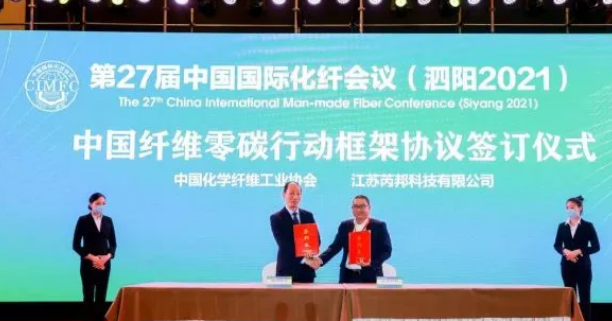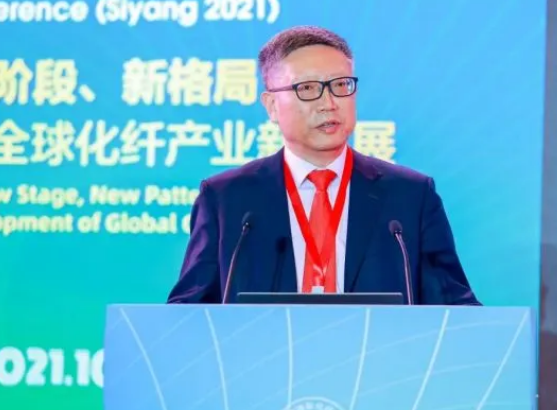"14th Five-Year Plan" development hotspot
To discuss the development trend of global chemical fiber industry
Affected by the epidemic, foreign industry representatives have been unable to come to the site to participate in the China International Chemical Fiber Conference for two consecutive years, but their concern for the conference and sharing information with the industry and thinking about the development of the industry is still strong.

Frederic Van Houte, President of the European Man-made Fiber Association, Ikuo Takeuchi, President of the Chemical Fiber Association of Japan, Kim Guok-jin, President of the Korean Chemical Fiber Association, S.C.Kapur, Secretary General of the Synthetic Fiber Industry Association of India, Mayuree, Honorary President of the Artificial Fiber Industry Association of Thailand Didpakdeechol, Su Baihuang, chairman of the artificial fiber manufacturing industry Trade Union in Taiwan, China, and other videos were recorded again to send blessings and support to the conference. They all mentioned that the world has become highly globalized and interdependent. The epidemic is still continuing, but with the gradual recovery of the economy, the further popularization of vaccines, and the innovation of process technology and digital empowerment to respond to changes in demand, the chemical fiber industry in various countries is getting out of the predicament to varying degrees. Based on digitalization, supply chain, carbon neutrality, fashion demand, etc., the global chemical fiber industry needs to work together, carry out more cooperation in more areas, take up the mission of implementing a circular economy, prepare for future sustainable development, and make the world a better place.
At the meeting, Fuyoshi Kenichi, executive vice president of the Chemical Fiber Association of Japan, introduced Japan's "sustainable development" series of actions, released the 2020 circular economy vision and plastic resource recycling strategy, and announced the goal of achieving "carbon neutrality" by 2050; Released reports such as "Future plastic Resource Recycling Measures", "Fashion and Environment Working Group", "Textile Industry Sustainable Development Research Group" and "Bioplastics Implementation Route"; Promulgation of the Plastic Resource Recycling Promotion Law. At the same time, the Japan Chemical Fiber Association has also formulated the industry sustainable development strategy - 2025 the Japan Chemical Fiber Association medium-term action Policy, and released the report of the Japan Chemical Fiber Association "Sustainable Development Working Group" in July 2021. The report prioritises PET recycling systems, fiber-to-fibre recycling systems, bio-based chemical fibres and tackling microplastics. He said that the Japanese textile and chemical fiber industry will always focus on sustainable development issues, and look forward to jointly exploring and practicing with the Chinese chemical fiber industry.
Frederic Van Houte, Director general of the European Man-made Fibers Association, said that the COVID-19 pandemic has had a serious impact on the supply chain of the European chemical fiber industry, but Europe has maintained its uniqueness in the field of chemical fiber. Facing the new international environment and development trend, the European chemical fiber industry has been laid out in the aspects of sustainable development, digital technology, cost effectiveness, quality and specialization, continuous innovation, fair competition and so on. For example, it has made the "dual transformation" as its main goal, aiming to make the entire economy green and digital; Building recycling centres and introducing a mandatory textile collection mechanism by 2025; Implement the "Carbon 55" plan to reduce greenhouse gas emissions by 55 percent by 2030; Implementing the European Zero Pollution Initiative and adopting a more stringent chemical policy; Improve production techniques, focus on the most efficient equipment, shut down or transform less efficient production lines; Increasing the use of certified renewable or recycled chemical fibers; Maintain diversification, small series, short-term delivery and other advantages, and enhance competitiveness in high value-added fibers.

Wang Jun, president of Oerlikon China
Georg Stausberg, CEO of Oerlikon Polymer Processing Solutions, and Jun Wang, President of Oerlikon China, introduced Oerlikon Group's value proposition for environmental and social governance (ESG) in an online and offline way, which enables customers to achieve higher output with fewer resources. Oerlikon's technology solutions are used to produce more than 35 million tons of chemical fibers annually, and its "Industry 4.0" factory solutions for filament spinning, elastic, staple and nonwovens are trusted by customers. In the future, the textile recycling and recycling amount of the entire industry and the corresponding manufacturing chain will be greatly improved, green textile production, chemical recycling and recycling, and textile intelligent manufacturing and equipment will gradually become the reality of the industry. Georg Stausberg revealed that Oerlikon can provide a variety of polyester-to-polyester physical recycling solutions, and there are several successful cases; When it comes to recycling technology for waste silk or textiles, it has invested in Worn again, a UK start-up that has developed a lab-wide technique for recycling polyester-cotton blends.
- ABB
- General Electric
- EMERSON
- Honeywell
- HIMA
- ALSTOM
- Rolls-Royce
- MOTOROLA
- Rockwell
- Siemens
- Woodward
- YOKOGAWA
- FOXBORO
- KOLLMORGEN
- MOOG
- KB
- YAMAHA
- BENDER
- TEKTRONIX
- Westinghouse
- AMAT
- AB
- XYCOM
- Yaskawa
- B&R
- Schneider
- Kongsberg
- NI
- WATLOW
- ProSoft
- SEW
- ADVANCED
- Reliance
- TRICONEX
- METSO
- MAN
- Advantest
- STUDER
- KONGSBERG
- DANAHER MOTION
- Bently
- Galil
- EATON
- MOLEX
- DEIF
- B&W
- ZYGO
- Aerotech
- DANFOSS
- Beijer
- Moxa
- Rexroth
- Johnson
- WAGO
- TOSHIBA
- BMCM
- SMC
- HITACHI
- HIRSCHMANN
- Application field
- XP POWER
- CTI
- TRICON
- STOBER
- Thinklogical
- Horner Automation
- Meggitt
- Fanuc
- Baldor
- SHINKAWA
- Other Brands




































































































































